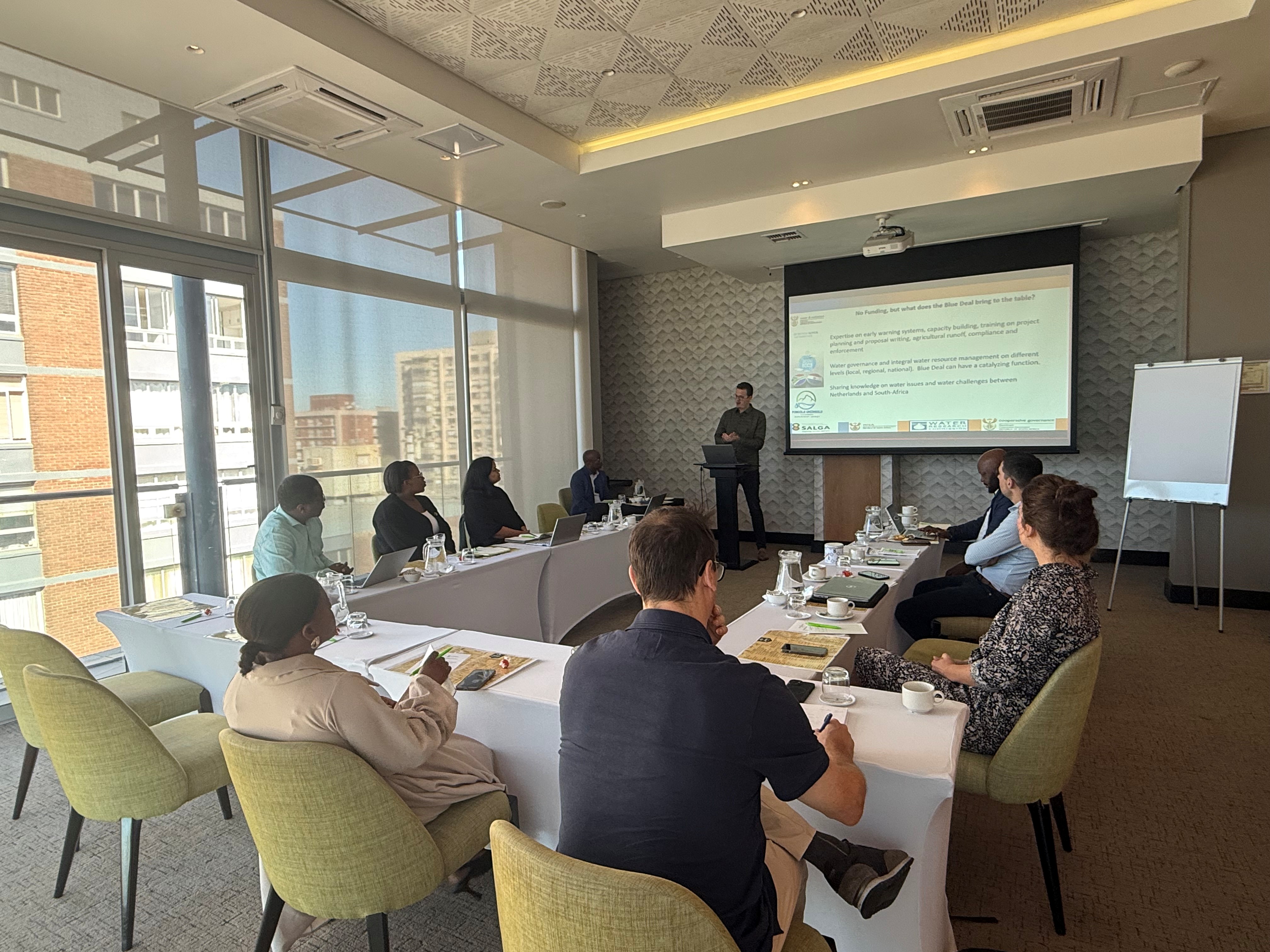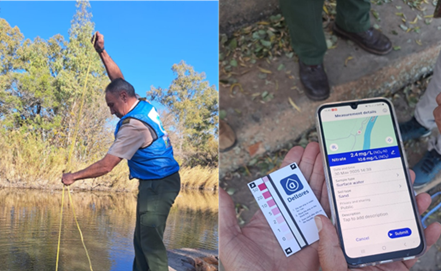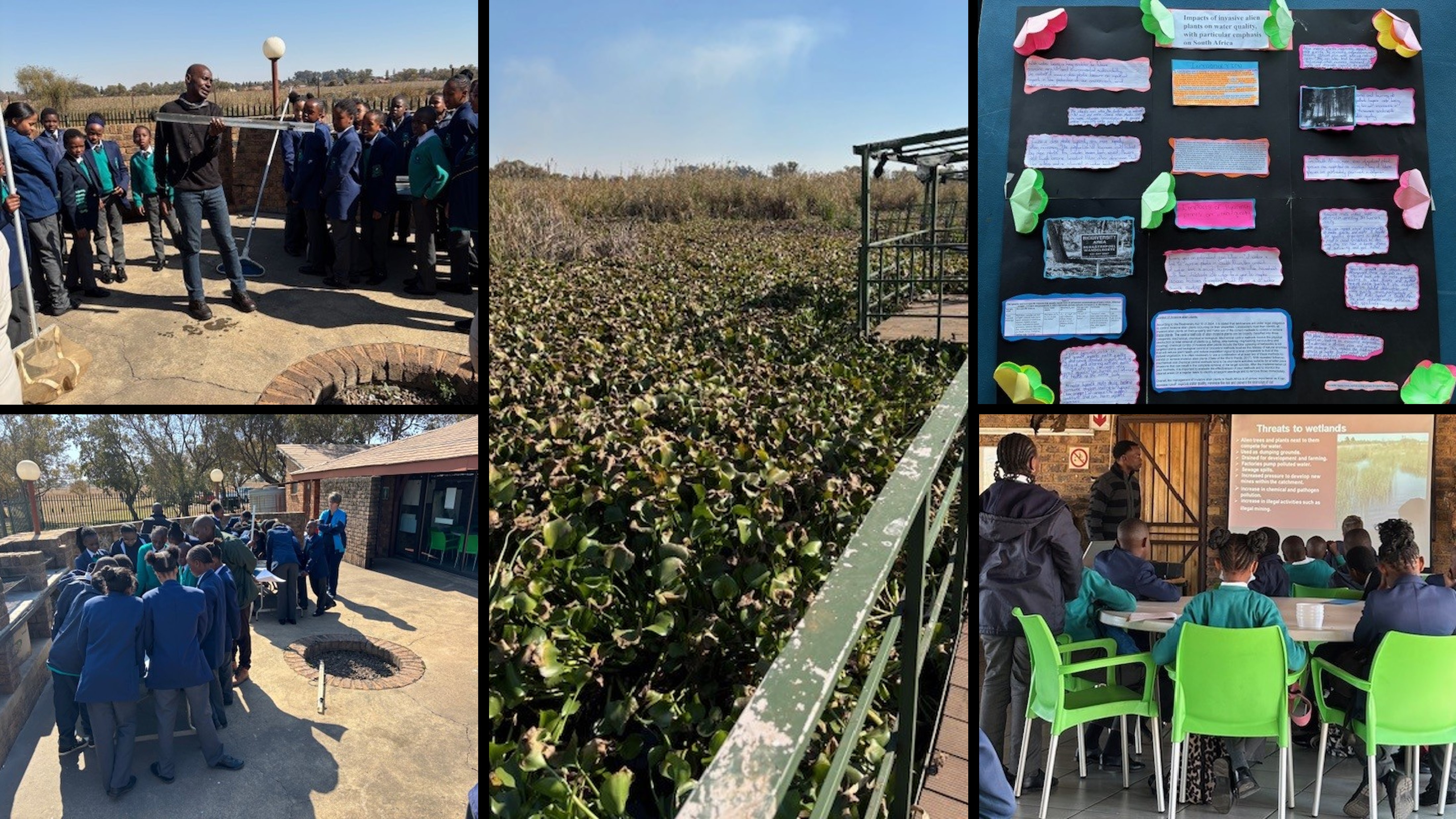Newsletter Blue Deal South Africa
August 2025

Dear Readers,
Autumn in the Netherlands, spring in South Africa… and a lot of Blue Deal activity everywhere.
Let’s start with the local projects, where wicked challenges are being addressed and lessons learned generated. In the Mgeni Msunduzi River project, new colleagues have started enthusiastically to make the catchment management strategy of PUCMA climate proof. The teams of Blesbokspruit en Vredefort Dome have joined forces, both working under VOCMA and trying to preserve the status of a natural reserve (UNESCO and RAMSAR respectively). In Theewaterskloof, the site selection for the non-sewered sanitation and grey water wetland pilots supported by WRC and SASTEP have started, and the Blue Deal citizen science activities led by BOCMA are well underway including hosting a Clear River Campaign hands-on clean-up at a tributary of the Palmiet River with Deputy Minister Seitlholo. Finally, the revival action plan for the Crocodile River project, which aims to get wastewater treatment plants to Green Drop level, has kicked off under the leadership of the new CEO of IUCMA.
Our national Protea Initiative, aiming at state-of-the-art collaborative information services on weather and water for South Africa and co-funded by Invest International, has reached a critical stage. In the coming months a list of Development Phase studies has to be delivered by DWS and consultants. Blue Deal supports this process in all possible ways.
Last but not least we look forward to the incoming visit of the Blue Deal South Africa National Steering Committee to the Netherlands in October, to inspire the CMAs in their development, foster collaboration and exchange.
Please enjoy reading more about all this in the newsletter!
With kind regards,
Marion Wierda (DWA Chief Executive Blue Deal South Africa, The Netherlands)
Eustathia Bofilatos (DWS Director of Institutional Oversight, South Africa)
Blue Deal Theewaterskloof
The Blue Deal Theewaterskloof team collaborated during a working visit in May to support sustainable solutions in water management, education, and waste processing. By working closely with local partners, the visit focused on knowledge exchange, strengthening relationships, and exploring practical ways to address shared challenges.
Collaboration in Action
Initial steps were taken towards a water-focused education program with local schools within Grabouw. In parallel, discussions with the Grabouw Water Users Association explored ways to better structure waste streams—leading to valuable insights and follow-ups. A knowledge exchange with WWF highlighted the link between water safety and nature conservation.
The team also noted the important Citizen Science work being done, where YEP Jordaan Asefi and two community members are supporting local community enrolment in the South African Scoring System river health assessments (SASS).
Engaging Youth Through Sport
A football match in an informal settlement in Grabouw sparked conversations with young people about waste, reuse, and clean water—combining sport, education, and community building.
Safety First
From travel to accommodation, safety was a top priority—because meaningful work starts with a secure foundation.
Key Outcomes
- Stronger local partnerships
- First steps in education and waste initiatives
- New insights into regional water challenges
A working visit by the Vredefort Dome and the Blesbokspruit team took place in late May and early June. Although the project teams had their own emphasis, there was also a joint action, namely the distribution of testing kits at various points in the Vaal River basin. These testing kits are used to measure nitrate levels in river water.
In the Blesbokspruit project, the testing strips were made available at the visitor centre, allowing school classes to learn about the state of water quality.
In the Vredefort Dome project, 10 landowners and organisations will test mainly nitrate at 10 locations within the Vredefort Dome for at least the next six months. The test results are to be uploaded to a central database via an app and can be viewed by DWS. The water quality tests take place once a week, participants inform each other in a WhatsApp group and report any anomalies observed at the time of testing. It thus shows the involvement of this group in developments in their own living environment. With this form of community science, the impact on water quality of upstream measures becomes more visible.

Blue Deal South Africa – Working Visit May/June 2025
During the recent Blue Deal working visit to South Africa, a major highlight was the school awareness programme at the Blesbokspruit Wetland Centre. Forty-five pupils from Dalpark Primary School were introduced to the importance of clean water and wetlands through hands-on training with newly provided water quality testing kits. These children are now “water ambassadors” in their communities, supporting citizen science and environmental awareness.
The team also explored potential collaboration with KlipSA, an NGO active in the Klip River catchment. Their success in mobilising local communities—such as churches and traditional healers—for environmental stewardship offers valuable lessons for the Blesbokspruit project, where local ownership is still developing.
In addition, the partnership with African Potential was deepened. Discussions focused on creating meaningful community engagement and ensuring long-term impact through shared data, local training, and co-ownership of solutions. Opportunities to link with WaterCAN for further citizen science efforts were also explored.
This visit underscored the power of education, partnerships, and community-driven action in tackling water challenges—laying the foundation for strengthened cooperation in the coming phase.

The Msunduzi-uMngeni Blue Deal team recently welcomed a new project leader and two new colleagues from the Netherlands. They all joined for the working visit in June and were introduced to the CEO/CFO and members of the board of PUCMA (Pongola-uMzimkulu Catchment Management Agency), to Nkosinjani Mkhize and Namrata Jugwanth (PUCMA/Department of Water and Sanitation (DWS)), to the stakeholders involved with Early Warning Systems and to some of our partners in Pietermaritzburg.
The project team organised meetings with partners and stakeholders:
-
Two successful and engaging meetings with board members and management of PUCMA where progress of the Blue Deal was discussed. One meeting at the beginning of the working visit and one meeting at the end. The Blue Deal team presented potential building blocks to establish a solid start for (further) cooperation and joined forces in integrated water resources management in KwaZulu-Natal
-
Meeting on project goals and achievements and to explore the Blue Deal’s support with some of the partners of the UEIP, NGO Conservation Outcomes and NGO Adopt a River
-
An integrated meeting on Early Warning Systems with presentations from DWS/PUCMA, Msunduzi municipality, eThekwini municipality, University of KwaZulu-Natal, uMngeni-uThukela Water, SAWS, COGTA
-
The Water Governance Assessment was conducted together with Nkosinjani Mkhize and Namrata Jugwanth (DWS/PUCMA)
A key focus during this visit was strengthening ties with the newly established PUCMA and discussing the implementation of our signed MoU.
Archive